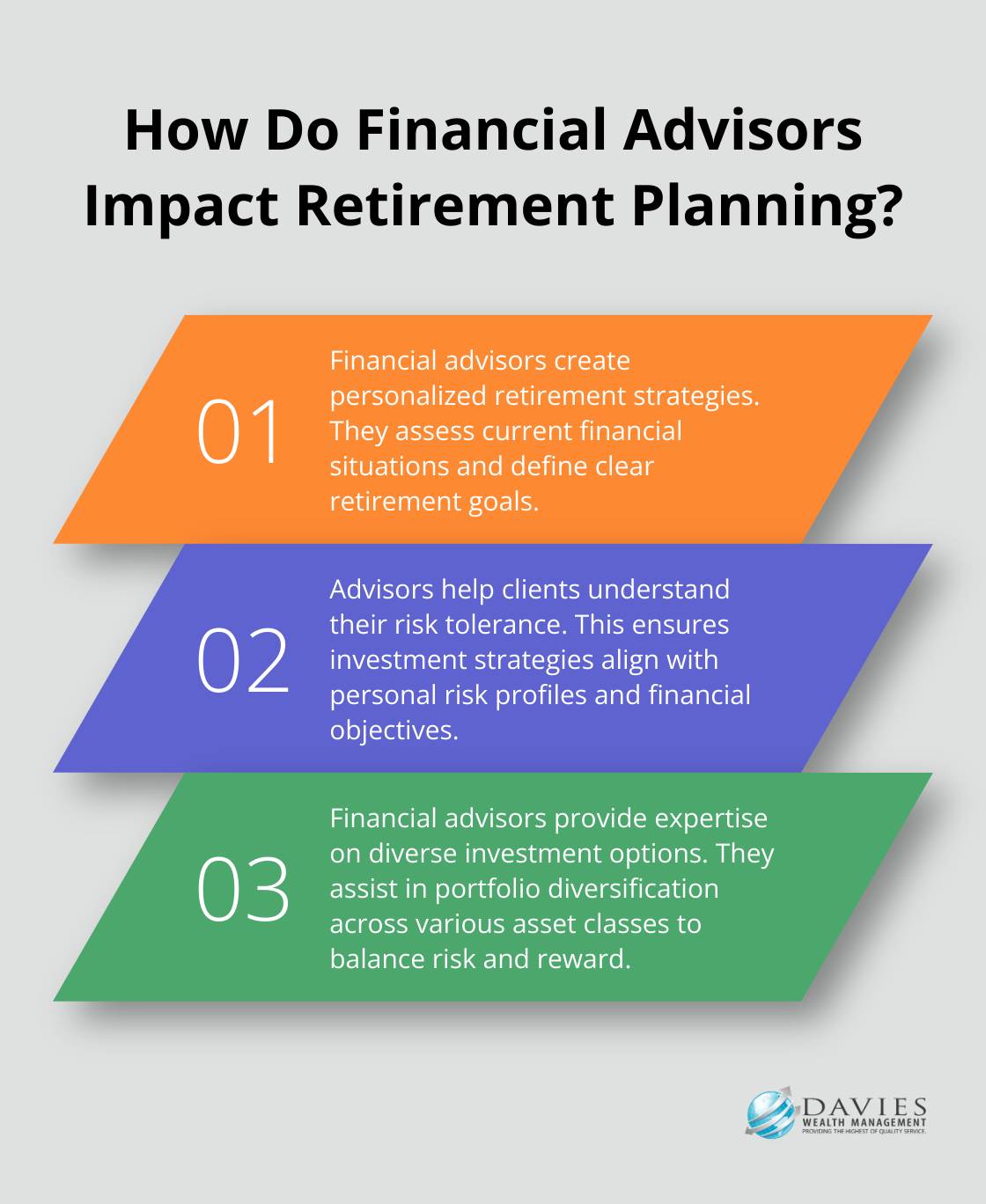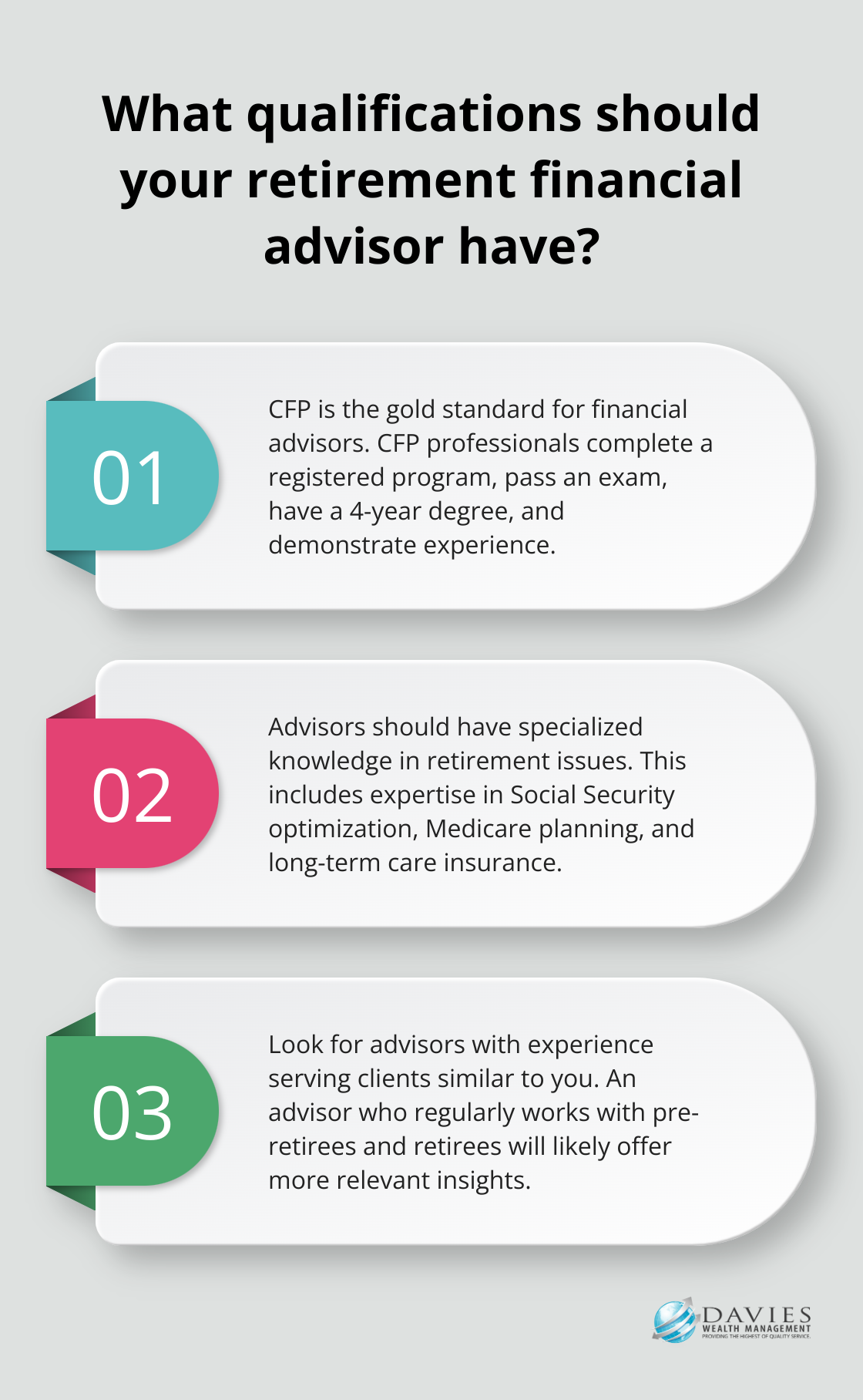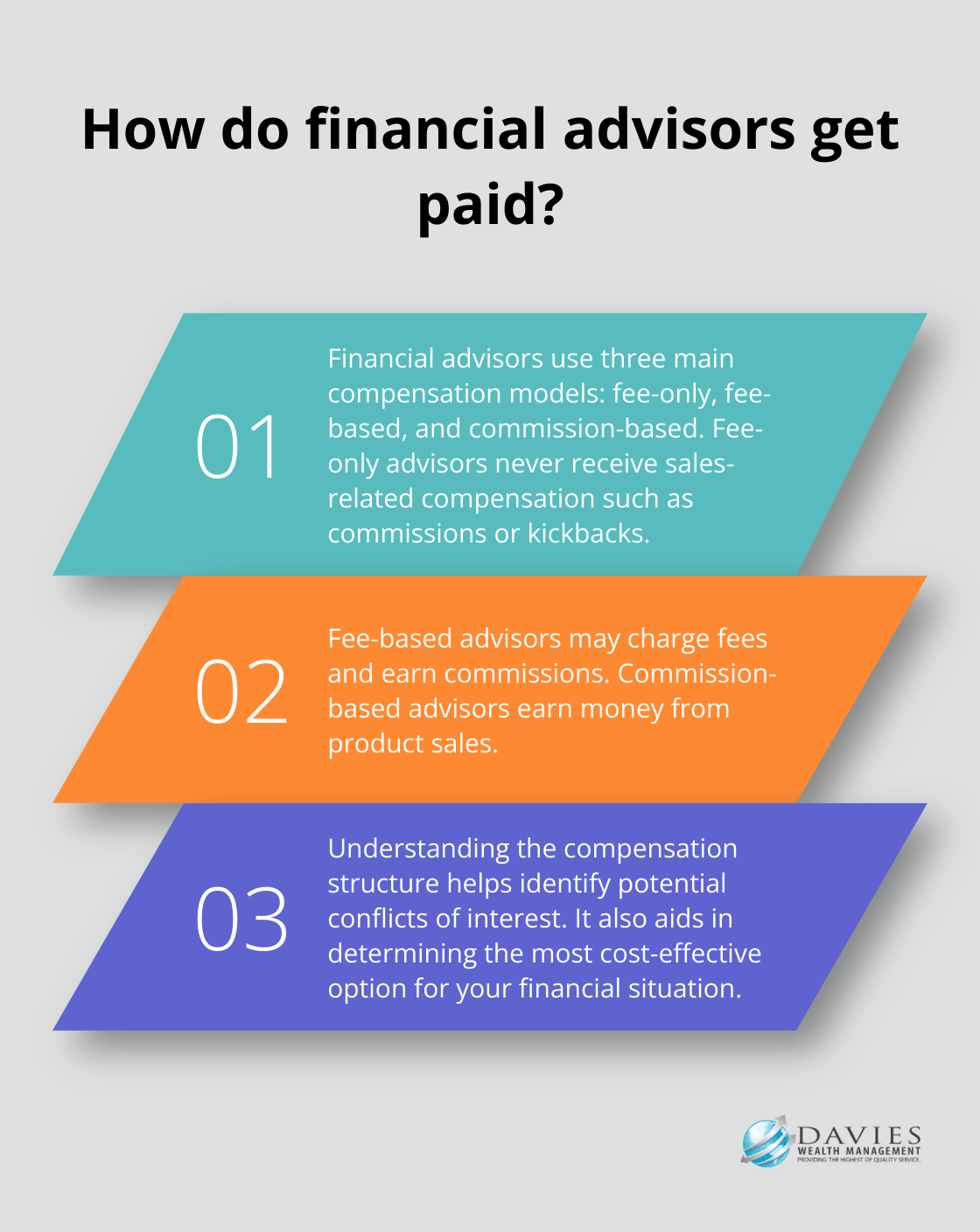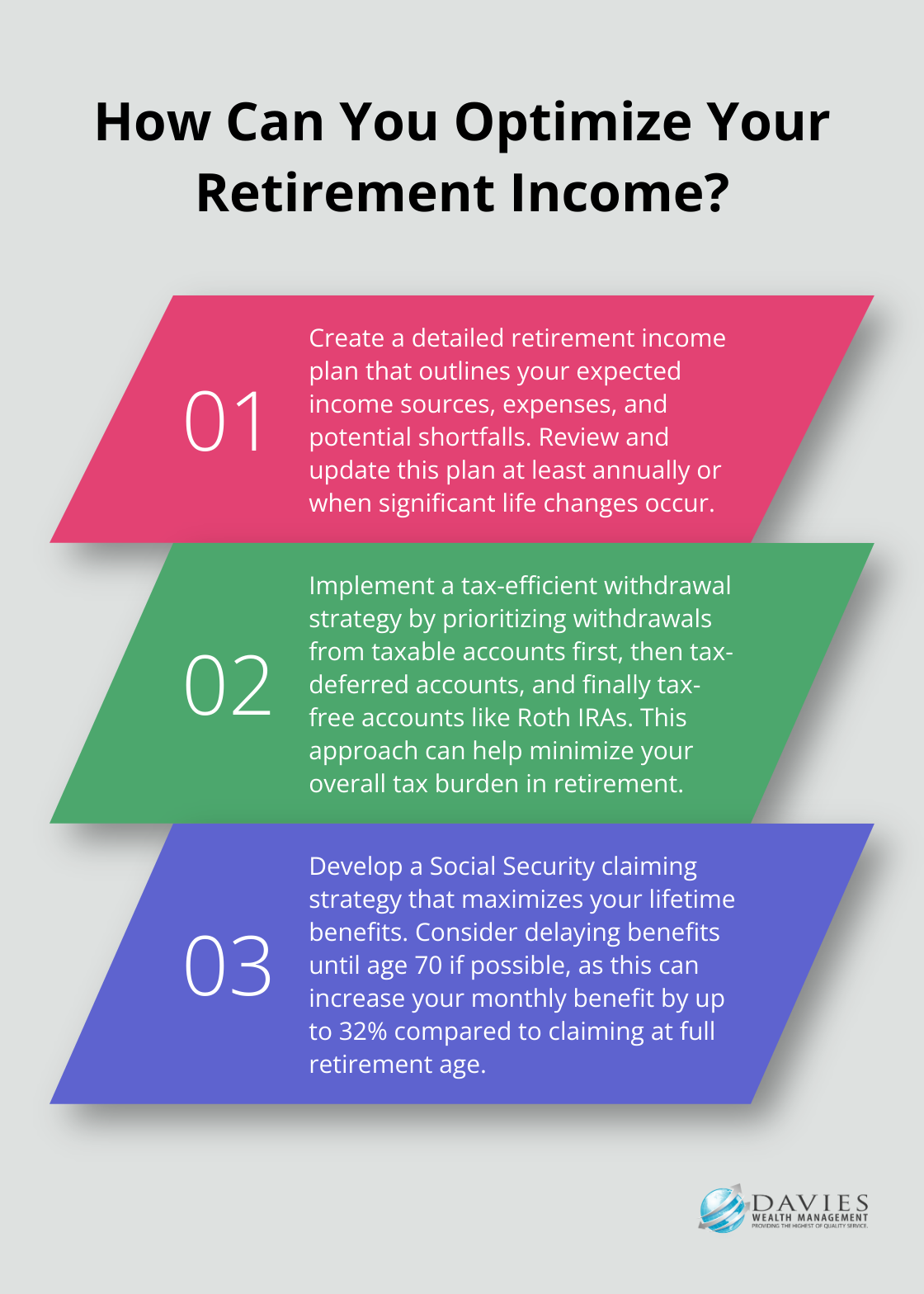Retirement planning can be complex and overwhelming. At Davies Wealth Management, we understand the importance of having a knowledgeable guide to help navigate this crucial life transition.
Choosing the right financial advisor for your retirement journey is a decision that can significantly impact your financial future. This guide will explore the key factors to consider and the essential questions to ask a financial advisor about retirement to ensure you find the perfect match for your needs.
What Does a Financial Advisor Do for Retirement?
A financial advisor plays a key role in retirement planning, acting as a guide through the complex landscape of financial decisions. Their expertise can significantly impact retirement outcomes.
Tailoring Your Retirement Plan
Financial advisors add value by matching clients with suitable investments and creating personalized retirement strategies. They start by assessing your current financial situation, including assets, debts, income, and expenses. They work with you to define clear retirement goals, which may include maintaining your current lifestyle, traveling extensively, or leaving a legacy for your family.

Risk tolerance is another critical factor in retirement planning. Your advisor will help you understand your comfort level with investment risk and how it aligns with your retirement timeline. This assessment ensures that your investment strategy matches your personal risk profile while still aiming to meet your financial objectives.
Navigating Investment Options
Financial advisors provide expertise on a wide range of investment options suitable for retirement. They help you diversify your portfolio across various asset classes (potentially including stocks, bonds, real estate, and alternative investments). This diversification aims to balance risk and reward based on your individual needs and market conditions.
As you approach retirement, your advisor might suggest shifting towards more conservative investments to protect your wealth. If you’re further from retirement, they might recommend a more aggressive strategy to capitalize on long-term growth potential.
Implementing Tax-Efficient Strategies
Tax considerations are a significant aspect of retirement planning that often gets overlooked. A skilled financial advisor can implement tax-efficient strategies to help maximize your retirement savings. This might include advice on:
- Utilizing tax-advantaged accounts like 401(k)s and IRAs
- Implementing Roth conversion strategies
- Managing required minimum distributions (RMDs)
- Timing Social Security benefits to minimize tax impact
Ongoing Monitoring and Adjustments
Retirement planning isn’t a one-time event. Your financial advisor should provide ongoing monitoring of your retirement strategy, making adjustments as needed based on changes in your life circumstances, financial goals, or market conditions. Regular reviews ensure that your retirement plan remains aligned with your objectives and adapts to any new opportunities or challenges that arise.
As we move forward, it’s important to consider the key qualifications you should look for in a retirement financial advisor. These qualifications will ensure that you’re working with a professional who has the necessary expertise to guide you through your retirement journey.
What Qualifications Should Your Retirement Financial Advisor Have?
Professional Certifications
The first step in selecting a financial advisor for retirement planning involves examining their professional certifications. The Certified Financial Planner (CFP) designation stands out as the industry’s gold standard. CFP professionals complete a CFP Board Registered Education Program, pass a rigorous exam, hold or earn a 4-year degree, and demonstrate financial planning experience. Other valuable certifications include the Chartered Financial Analyst (CFA) for investment expertise and the Chartered Financial Consultant (ChFC) for advanced financial planning knowledge.
Specialized Retirement Knowledge
Your advisor should possess in-depth knowledge of retirement-specific issues. This expertise should cover Social Security optimization strategies, Medicare planning, and long-term care insurance. An advisor well-versed in Social Security can help you maximize your benefits through strategies such as allowing the higher earning spouse to apply for benefits at full retirement age and then suspend them, potentially benefiting the lower earning spouse.
Relevant Experience
Experience with clients in similar situations to yours proves invaluable. If you’re a professional athlete, for instance, an advisor with a specialized focus on serving athletes could offer particular benefits. Such an advisor understands the unique financial challenges athletes face, such as short career spans and fluctuating income.

For non-athletes, try to find an advisor who has experience with clients in your age group, income bracket, and with similar financial goals. An advisor who regularly works with pre-retirees and retirees will likely offer more relevant insights than one who primarily serves younger clients.
Fiduciary Commitment
Ensure your advisor operates as a fiduciary, legally obligated to act in your best interests. A fiduciary is a person who owes a duty of care and trust to another and must act primarily for the benefit of the other in a particular activity. This commitment helps prevent conflicts of interest and ensures that the advice you receive aligns with your specific needs rather than driven by commissions or product sales.
Ongoing Education
The financial world evolves rapidly, and your advisor should keep pace. Look for an advisor who prioritizes ongoing education and stays current with the latest trends, regulations, and strategies in retirement planning. This commitment to learning ensures you receive up-to-date advice tailored to the current financial landscape.
As you consider these qualifications, you’ll want to prepare a list of questions to ask potential advisors. These questions will help you gauge their expertise, approach, and fit for your specific retirement needs.
Essential Questions for Your Potential Financial Advisor
Understanding Compensation Structures
One of the most important questions to ask is how the advisor receives compensation. Financial advisors typically use one of three compensation models: fee-only, fee-based, or commission-based. Fee-only financial advisors can never receive any form of sales-related compensation such as commissions, kickbacks, or referral fees. Fee-based advisors may charge fees and earn commissions, while commission-based advisors earn money from product sales. Understanding the compensation structure helps you identify potential conflicts of interest and determine the most cost-effective option for your situation.
Exploring Investment Philosophies
Ask potential advisors about their investment philosophy. This question reveals their approach to managing your money and whether it aligns with your goals and risk tolerance. Some advisors focus on passive index investing, while others prefer active management. Some may emphasize diversification across asset classes, while others might concentrate on specific sectors. The advisor’s philosophy should match your preferences and financial objectives.
Discussing Review and Adjustment Frequency
Regular reviews of your retirement plan are essential to keep it on track. Ask how often the advisor plans to review and adjust your retirement strategy. Many advisors recommend quarterly reviews for most clients, with more frequent check-ins during periods of significant market volatility or personal life changes. The frequency of reviews should align with your comfort level and the complexity of your financial situation.
Requesting Client References
Don’t hesitate to ask for references from long-term clients, particularly those in similar financial situations to yours. Speaking with these references can provide valuable insights into the advisor’s communication style, responsiveness, and ability to navigate various market conditions. While privacy regulations may limit the information advisors can share, many will have clients willing to speak about their experiences (this can be especially helpful if you’re considering working with a smaller firm).
Inquiring About Specializations
Try to understand if the advisor has any specializations that align with your needs. For example, if you’re a professional athlete, you might want to work with an advisor who has experience managing the unique financial challenges athletes face (such as short career spans and fluctuating income). Davies Wealth Management, for instance, offers specialized services for professional athletes, addressing these specific needs.

Final Thoughts
Selecting the right financial advisor for your retirement journey will impact your financial future. The process requires careful consideration of various factors, including the advisor’s qualifications, experience, and approach to retirement planning. A personalized approach to retirement planning proves invaluable, as every individual’s financial situation, goals, and risk tolerance differ.

The questions to ask a financial advisor about retirement should cover topics such as their compensation structure, investment philosophy, review frequency, and client references. These inquiries will help you gauge their expertise and determine if they’re the right fit for your retirement planning needs. You should take action to find a qualified advisor as a step towards securing your financial future.
Davies Wealth Management understands the complexities of retirement planning and offers personalized solutions to help you navigate this important life transition. Our team of experienced professionals provides comprehensive wealth management services tailored to your unique needs (whether you’re a professional athlete, business owner, or individual seeking financial security). You can approach retirement with confidence by partnering with a knowledgeable and trustworthy advisor.



Leave a Reply